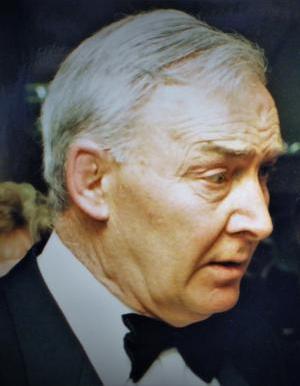John Robson Kirkup
17th March 1928 – 17th March 2024

Obituary by Ian Stephen
John Robson Kirkup
John Robson Kirkup was born on 17th March 1928 at Chester-le-Street, County Durham. His mother was a schoolteacher, and his father was a tenant farmer, supplying food to nearby coal mines, but later working as a blast furnaceman in Corby. John attended Kettering Grammar School and was initially intent on joining the Merchant Navy. However, his headmaster suggested studying medicine and he gained a place to read natural sciences at Emmanuel College, Cambridge. He then went to St Mary’s Hospital in London, where he was taught bacteriology by Alexander Fleming. He qualified in 1952.
During his house jobs, he found that he had a talent for fracture manipulation and decided on a career in orthopaedics. He did his National Service in the Royal Navy and was a Surgeon-lieutenant in the Naval Dockyard in Malta where he saw all sorts of traumatic injuries. On return to civilian life, he was surgical registrar at the Norfolk and Norwich Hospital, where he was taught by Ken McKee, and then a senior registrar at the Bath and Wessex Orthopaedic Hospital. He was appointed as a consultant in Bath in 1964.
During his long career as an orthopaedic surgeon working in the Bath Clinical Area, John specialised in lower limb surgery, with a particular interest in children’s leg lengthening after polio. Later, he specialised in foot and ankle surgery, particularly the surgical treatment of rheumatoid arthritis, and developed the Bath and Wessex ankle joint replacement. He retired from active practice in 1988. He was a long-standing fellow of the BOA, serving on Council, and he was appointed as Honorary Archivist in 1980. He was in this post for twenty years, longer than any of his predecessors since it was inaugurated in 1953. He also acted as President of the British Society for the History of Medicine and of the History of Medicine Section of the Royal Society of Medicine.
He developed an interest in medical history, particularly the evolution of surgical instruments. He had gained a Diploma in Medical History from the Society of Apothecaries in London in 1979 and later acted as Lecturer in Surgical History to the Diploma Course. He was an Honorary Curator at the Royal College of Surgeons of England in London, where he helped to identify and catalogue the surgical instrument collection and made many contributions to the development of the Hunterian Museum. He had a large personal collection of medical antiques and donated many of them to the Museum of Medicine and Health in the Manchester Medical School. He founded the Historical Medical Equipment Society in 1996 and acted as chairman until 2004.
He published three important reference books: The Evolution of Surgical Instruments (2006), which is considered perhaps the most prominent work on the evolution of surgical instruments yet published: A History of Limb Amputation (2007) and An Illustrated History of Hip Joint Surgery: from Hippocrates to Charnley (2014). He also wrote many papers and book chapters on surgical instruments, including 31 articles in the Journal of Medical Biography, and presented many eponymous lectures. He was awarded the Sir Arthur Keith medal and an MBE for services to medical heritage in 2011. John was married to Pierrette Léger, a French teacher and artist from Bordeaux and they had four children. His wife and children all survive him. He died on his 96th birthday, 17th March 2024.
